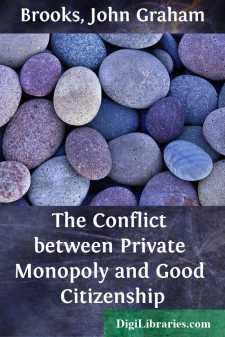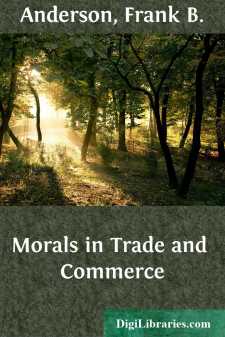Categories
- Antiques & Collectibles 13
- Architecture 36
- Art 48
- Bibles 22
- Biography & Autobiography 813
- Body, Mind & Spirit 142
- Business & Economics 28
- Children's Books 17
- Children's Fiction 14
- Computers 4
- Cooking 94
- Crafts & Hobbies 4
- Drama 346
- Education 46
- Family & Relationships 57
- Fiction 11829
- Games 19
- Gardening 17
- Health & Fitness 34
- History 1377
- House & Home 1
- Humor 147
- Juvenile Fiction 1873
- Juvenile Nonfiction 202
- Language Arts & Disciplines 88
- Law 16
- Literary Collections 686
- Literary Criticism 179
- Mathematics 13
- Medical 41
- Music 40
- Nature 179
- Non-Classifiable 1768
- Performing Arts 7
- Periodicals 1453
- Philosophy 64
- Photography 2
- Poetry 896
- Political Science 203
- Psychology 42
- Reference 154
- Religion 513
- Science 126
- Self-Help 84
- Social Science 81
- Sports & Recreation 34
- Study Aids 3
- Technology & Engineering 59
- Transportation 23
- Travel 463
- True Crime 29
The Scrap Book, Volume 1, No. 3 May 1906
by: Various
Description:
Excerpt
The Latest Viewpoints of Men Worth While
Stuyvesant Fish Says That Americans Are Wasteful, While Pastor Wagner Praises Our National Character—John D. Rockefeller, Jr., and Professor Fagnani Discuss Joseph's Corner in Corn—Thomas F. Ryan Holds That Opportunity to Win Wealth is Necessary to Industrial Progress—Andrew Carnegie as the Financier of Spelling Reform—With Other Opinions of Representative Men on Questions of the Time.
Compiled and edited for The Scrap Book.
A PLEA FOR THE HIGHER ECONOMY.
Unnecessary Waste is the Crying Evil in
All Our Business Administration,
Says Stuyvesant Fish.
"The Higher Economy" is the theme upon which Stuyvesant Fish, the well-known president of the Illinois Central Railroad, discourses in the Arena for March. Mr. Fish is a solid figure in finance. His idea of economy is not parsimony, but thrift—the prevention of waste. The higher economy, he points out, is needed in the household, in the state, and in the management of corporations. First, he speaks of waste in the household:
No one will question that our people are spendthrifts, earning money freely and wasting it to such an extent as to make it proverbial that what is thrown out of our kitchens would support a frugal people in almost any country in Europe.
Conditions in local, State, and Federal government are much in need of reform, continues Mr. Fish:
There is not only waste and extravagance in administration, and what is now commonly called graft, which is a combination of bribery and larceny, but, what is economically worse, the laws are so framed as not to get the best use out of the taxes paid by the people. What we have to fear is not so much the magnitude of the appropriation as that our laws require that an uneconomical and therefore bad use be made of them.
In the Post-Office Department, for example, there was, in 1905, a deficit of fourteen million dollars, which the writer thinks was due to laws and not to administration. Government free matter cost twenty million dollars. Rural free delivery cost nearly twenty-one millions, the receipts covering only about one-quarter of this sum. Mr. Fish does not think it surprising that under laws which not only permit, but require, such a waste of public revenues there is a deficit, and that the deficit should be growing rapidly.
Under the head of corporate management, Mr. Fish says:
I need not repeat that the country is prosperous, and likely to continue so. While fully appreciating these facts, we cannot shut our eyes to the trouble that has been going on in the center of our financial system.
Having looked into the matter myself somewhat carefully of late, I beg to say to you in all seriousness that not only in the insurance companies, but in many other corporations, there is need of the advice and probably the knife of the trained surgeon. Without pretending to any superior knowledge on the subject, I think that the root of the evil lies in too few men having undertaken to manage too many corporations; that in so doing they have perverted the powers granted under corporate charters, and in their hurry to do a vast business have in many cases done it all.
We who—as breadwinners, as taxpayers, and as stockholders—provide the wherewithal suffer because we have set others to rule over us without holding them to that strict accountability for the discharge of their trust which the common law and common sense alike demand. Indeed, things have come to such a pass that in certain quarters it is now considered indecorous and ill-bred for us, the many, even to discuss, much less to correct, the shortcomings of the elect few. Such was neither the theory nor the practise on which our forefathers ordered the economy of this republic.
KINDLY WORDS FROM PASTOR WAGNER.
The Author of "The Simple Life" Sets
Forth in Friendly Terms His
Impressions of America.
Charles Wagner, the author of "The Simple Life," has published a volume, "Vers le Cœur de l'Amérique" ("Toward the Heart of America"), in which are recorded his impressions of the United States as gathered during his visit here in the fall of 1904. He is no globe-trotting critic, nor is he a collector of statistics; he gives merely an account of what he has seen.
Of President Roosevelt the famous French pastor holds a high opinion, as this bit of appreciation indicates:
A man in sympathy with the humble; equal to all emergencies; as great as the greatest; truly a man, one of those who do most honor to the human family.
One feels that he is ready for any struggle; willing to step behind the gun himself, if need be. Thus in regard to subjects relating to public spirit, nothing which might contribute to promoting a mutual understanding among American citizens leaves him indifferent. He often says that that which is important for the welfare and the power of the people is not so much the existence of a few isolated characters of extraordinary powers as a good general level of public spirit.
Effort, individual energy, the sentiment of responsibility, a primordial decision to go straight ahead and not be diverted—all this, combined with a sociable disposition and a willingness not to go to the end of one's right out of regard for one's neighbor, is what he most appreciates.
As a pastor, M. Wagner was struck by the depth of religious feeling in the United States. The great diversity of creeds signified to him vitality and liberty, not the loss of a central belief. He was surprised, too, to find such cordial relations existing among different sects.
In our schools, he says, it is possible to trace the universality of the ideals of democratic government. The public schools are the mills to which comes the grist of immigration, to be ground into American citizens.
To the American character he admits the advantages of youth—sincerity, frankness, prompt initiative; and with these, the maturer qualities of endurance and patient wisdom....















